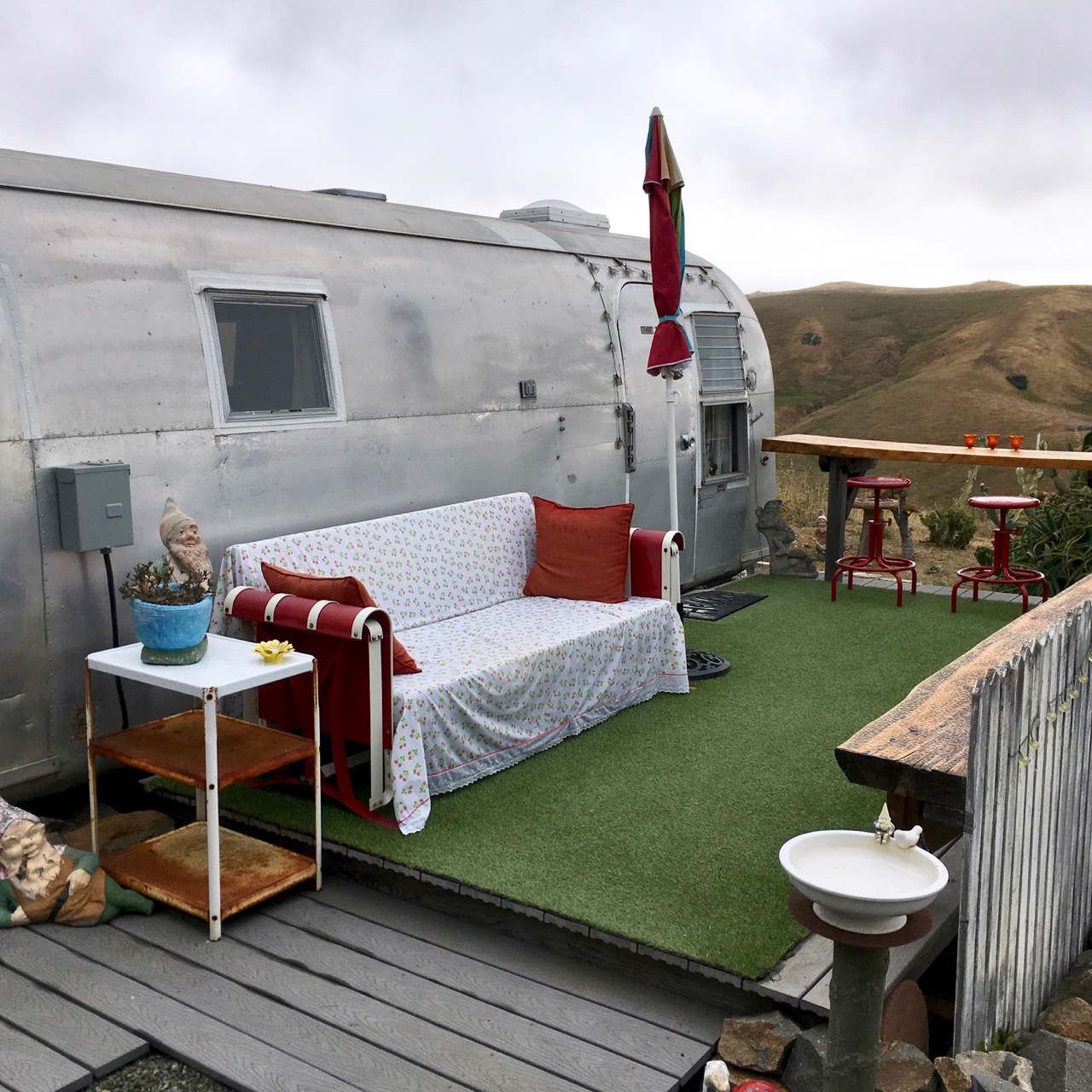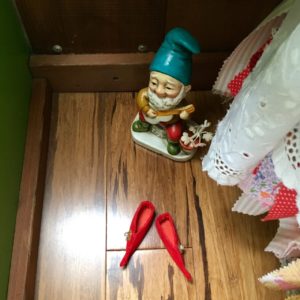Gnomes and Ghosts and Other Things
We went on a road trip with our friends Kit and Beverly and spent two nights in a pair of Airstream trailers. The one Monte and I stayed in was like a tin can, its interior metal walls left mostly bare except for hundreds of re-arrangeable poetry magnets. But other aspects of the decor captured a sort of on-the-road travel theme: a curtain with a map print, a vintage ViewMaster with reels of America-the-beautiful scenes, a collection of old license plates. There was a sense of going someplace even while sitting still, but I felt cozily enclosed and ensconced in it.
A short distance away was our friends' trailer. This was the Gnome Home, a theme executed with dizzying thoroughness, right down to a teeny-tiny pair of red gnome slippers on the floor by the bed. It was not just retro, but pleasantly regressive. While our husbands were on an excursion, I walked over to pay Bev a visit, and it was as if I'd stepped inside of 1959. We sat together on a coral-colored couch holding mugs of coffee. There were turquoise blue walls and flower print curtains, puzzles and board games, whimsical unicorns and twinkle-eyed gnomes.It was very good to be elsewhere. Earlier in the week, I'd been trying to tackle the Trunk of Pain, reading old letters from people I have loved, revisiting their suffering and sadness. Why do I keep all this stuff? I managed to throw some of it away, but finally, after reading one particularly grueling exposition of laments from my sister, I closed the lid and shoved the trunk back into its cobwebby corner of the garage.
Oh, my dear sister. I did not in those days comprehend how great her dreams were, and also how small and ordinary, or that the unattainability of the small and ordinary dreams was the cruelest thing of all. I did not then recognize how much like me she was, a version of me with more fire and strength, but trapped in a broken body. I did not then realize how urgent it is that we find our courage, speak our truths, go out of our way to be loving. I did not then understand the ferocious, unequivocal onrush of everything, how abruptly it ends, and how long death lasts. I cannot resolve anything, but I am forever sorry.It wasn't just my sister's letters. There are other voices in that trunk and in my head, most of them–two siblings and my parents–now deceased. Often they are angry and disappointed...at their circumstances, and many times at me. I was not brave or heroic or even always kind, and I didn't adequately rise to the challenges of being part of my family of origin, which were numerous and unusual. I wish I had been better, but I was sufficiently daunted by my own issues, distracted by imagined possibilities, busy being young. I only saved myself.
And I'm ashamed. Some people call it survivor guilt, some people call it grief. Some people tell me that enlightenment begins with acceptance and forgiveness of oneself, and there is no other path. Some people say I need therapy. Some suggest medication, others swear by meditation. Maybe keeping the Trunk of Pain is just another way I punish myself.
I want so much to have learned from it, and to somehow apply this learning. As Elisabeth Kübler-Ross wrote, persons who go through loss and struggle can work their way through to "an appreciation, a sensitivity, and an understanding of life that fills them with compassion, gentleness, and a deep loving concern." I strive for that; I write for that. Sometimes, though, it feels fatuous and futile. Nothing is changed, and I will never be absolved. I own these feelings.
But back to the Gnome Home, where I was sitting on the couch with Beverly in 1959 drinking coffee and gabbing, like a couple of housewives taking a break while the hubbies were at the office.
We talked about lighthearted things, but also about complexities of families, and coping with loss, and I told her about the Trunk of Pain, how haunted and tormented I felt, and that I'd wanted to throw away at least some of that stuff, lighten up a bit. She thought I should consider burying it.
"Kit and I will help you dig a big hole in the ground," she said. "We'll have a ceremony. There needs to be a ceremony."
This has its appeal. I'll know the letters are there, sort of naturally decomposing, but they'll also be gone, dispensed of with dignity.
And speaking of burial, Bev told me a story about going to the cemetery with her granddaughter Sadie to her parents' graves. Sadie lay down on the ground right there, playfully assuming a dead person's pose.
"Don't you love to look at the sky and the clouds?" she asked Bev, while lying on the ground.
"I used to," Bev replied.
"Why don't you anymore?" asked Sadie.
She sat up, grabbed Bev's hand, and pulled her down to the ground. And there they lay, side by side, looking at the sky together.I love that little anecdote. Even the cemetery becomes a setting for being alive in the moment, with death benignly in the background.
And "Why don't you anymore?" has become one of my favorite questions. Why must we be so sensible? Why do we quell those delightful impulses? It reminds me of something William Stafford said about kids: “They dance before they learn there is anything that isn't music.”
In the course of the week preceding our road trip and our stay in the Airstream trailers, I saw a hooded oriole on the railing of our deck, brilliant yellow and black, a bright and thrilling presence. I watched the children at the local school perform a musical revue, and one of the parents, who had long ago been in my sixth grade class, came up and introduced me to his kids. I attended a grass roots meeting of earnest citizens who refuse to be bowed down by the nightmare of the current administration, and I felt a kinship with them, and a hopefulness that refuses to die. I rode a bicycle, saw Monte surfing, stepped out into the amazing summer light of 8 p.m. My heart soars or fills with gratitude many times a day.
So the sad memories asserted themselves like an episode of stormy weather, and now it's quieting down, and I'm still here, still trying, still amazed. It brings to mind these words by the poet Mary Oliver on the uses of sorrow:Someone I loved once gave me a box full of darkness.It took me years to understand that this, too, was a gift.It's a heavy gift to shlep, but she's right.
Meanwhile, it's hard to take things seriously in an Airstream trailer filled with unicorns and gnomes.



